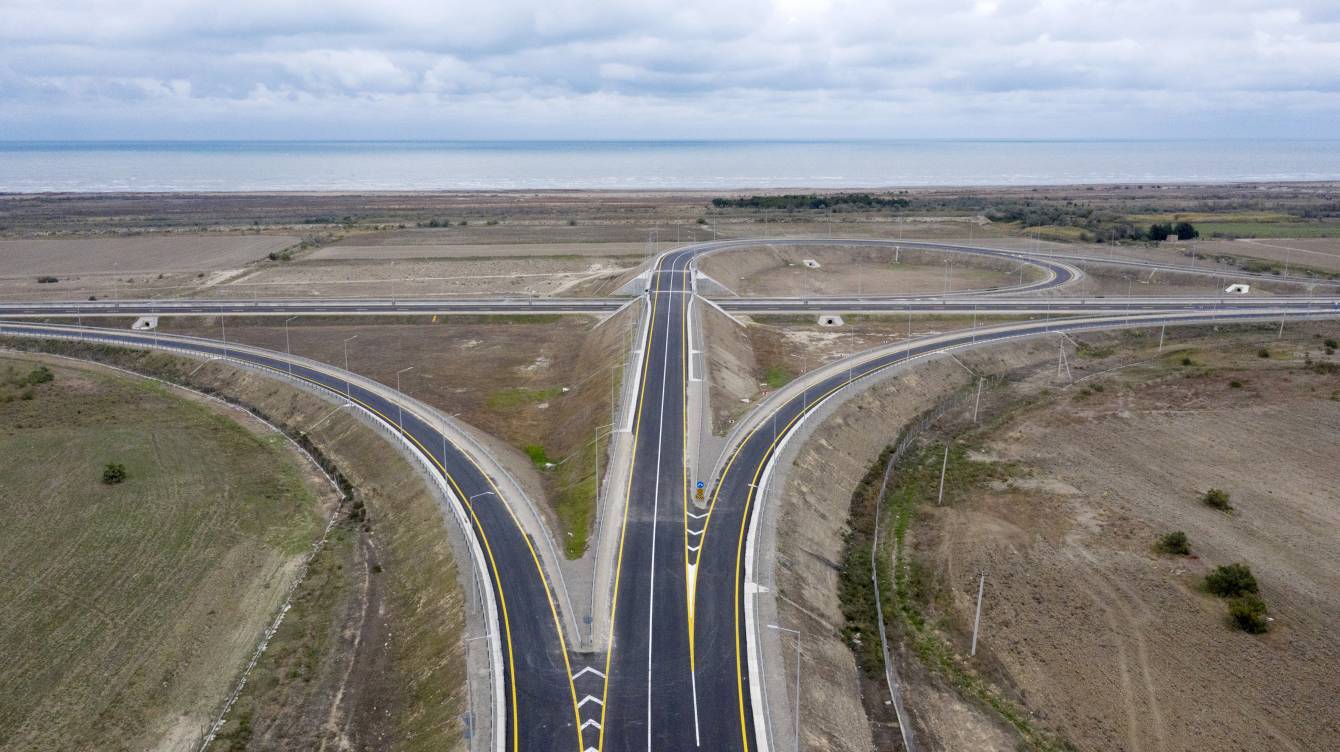The Azerbaijani authorities have taken a significant step in facilitating passenger and cargo transportation along the North-South Transport Corridor by launching a brand-new road that stretches across the country and connects it to Russia.
On Monday, President Ilham Aliyev inaugurated the Baku-Guba-Russia toll road, a 150-kilometer, first-class highway that runs northward from Haji Zeynalabdin Taghiyev settlement along the Caspian Sea to the border with Russia.
This high-quality four-lane highway is a crucial part of the North-South Transport Corridor, offering a 13-kilometer shorter route than the older road. Construction has been underway since 2017, resulting in the creation of 40 overpasses and bridges, along with 52 underpasses. Additionally, over 2,000 traffic signs and information boards have been installed along the road.
Six toll collection and weight control points have been placed along the 129-kilometer section of the highway to collect fees approved by the Tariff Council of Azerbaijan. Tolls are assessed based on factors such as distance, weight, and the number of passages per month.
Payment can be made using cards available at the road’s entrance and exit, as well as at other locations along the route.
The North-South Corridor, spanning 7,200 kilometers from India to Russia, comprises a multi-modal mix of rail, road, and sea transport routes, optimizing intercontinental trade among participating states and other stakeholders.
This corridor connects Europe, the countries of the Persian Gulf, and the Indian Ocean. Both the Western and Eastern routes of the corridor pass through Iran, with the Western route also traversing Azerbaijan, while the Eastern route extends through Kazakhstan and Turkmenistan. Furthermore, it is expected to facilitate direct sea transportation from Russia via the Caspian Sea to Iran.
Azerbaijan has been actively involved in the creation and operation of the North-South Transport Corridor in accordance with the “Strategic Roadmap for the Development of Logistics and Trade in the Republic of Azerbaijan.” As the only country in the world that shares land borders with both Russia and Iran, Azerbaijan plays an unprecedented role in significant regional transportation mega-projects. The ultimate goal is to transform the country into a key transport and logistics hub at the crossroads of two transcontinental corridors, including the East-West Middle Corridor, in the heart of Eurasia.
The Baku International Sea Trade Port, also known as the Port of Baku, in Azerbaijan, stands out as a significant maritime hub. Despite being under construction, the port is operational during its first phase of development. This Caspian Sea port is the largest in the region, with a throughput capacity of up to 15 million tons of cargo, including 10,000 twenty-equivalent units (TEU). After the completion of the second phase, the port will be capable of handling 25 million tons of cargo, including 500,000 TEU.
Azerbaijan also supports the construction of a railway segment of the North-South Transport Corridor, specifically the Astara-Rasht-Qazvin railroad.
In May 2023, Russia announced its cooperation with Iran to build the Astara-Rasht-Qazvin railroad. Moscow has issued a $1.3 billion inter-state loan to finance the project, which will require a total investment of $1.6 billion.
“In line with our agreement, the construction should take four years. Designing and geological prospecting are already underway. We plan that all work should be completed in Q3 2027 or by the end of 2027,” Russian First Deputy Prime Minister Andrei Belousov said in May.
According to him, the North-South transportation capacity will increase threefold, from the current 15 million tons to 41-45 million tons of cargo per year by 2030.







 President Ilham Aliyev shed light on the evolving contours of the peace process with Armenia during an international conference in Baku this week. ...
President Ilham Aliyev shed light on the evolving contours of the peace process with Armenia during an international conference in Baku this week. ...
 Azerbaijan and Armenia started the process of demarcation of their border on Tuesday, with the installation of the first border markers based on ge...
Azerbaijan and Armenia started the process of demarcation of their border on Tuesday, with the installation of the first border markers based on ge...
 President Aliyev emphasized the critical role of the North-South Transport Corridor in fostering transport cooperation between Azerbaijan and Russi...
President Aliyev emphasized the critical role of the North-South Transport Corridor in fostering transport cooperation between Azerbaijan and Russi...
 Iran and Pakistan have signed eight cooperation documents in various fields, and agreed to strengthen ties to fight terrorism in the region.
Iran and Pakistan have signed eight cooperation documents in various fields, and agreed to strengthen ties to fight terrorism in the region.
 As the conflict between Ukraine and Russia escalates, the strategic importance of Kharkiv, Ukraine's second-largest city, has come sharply into focus.
As the conflict between Ukraine and Russia escalates, the strategic importance of Kharkiv, Ukraine's second-largest city, has come sharply into focus.



